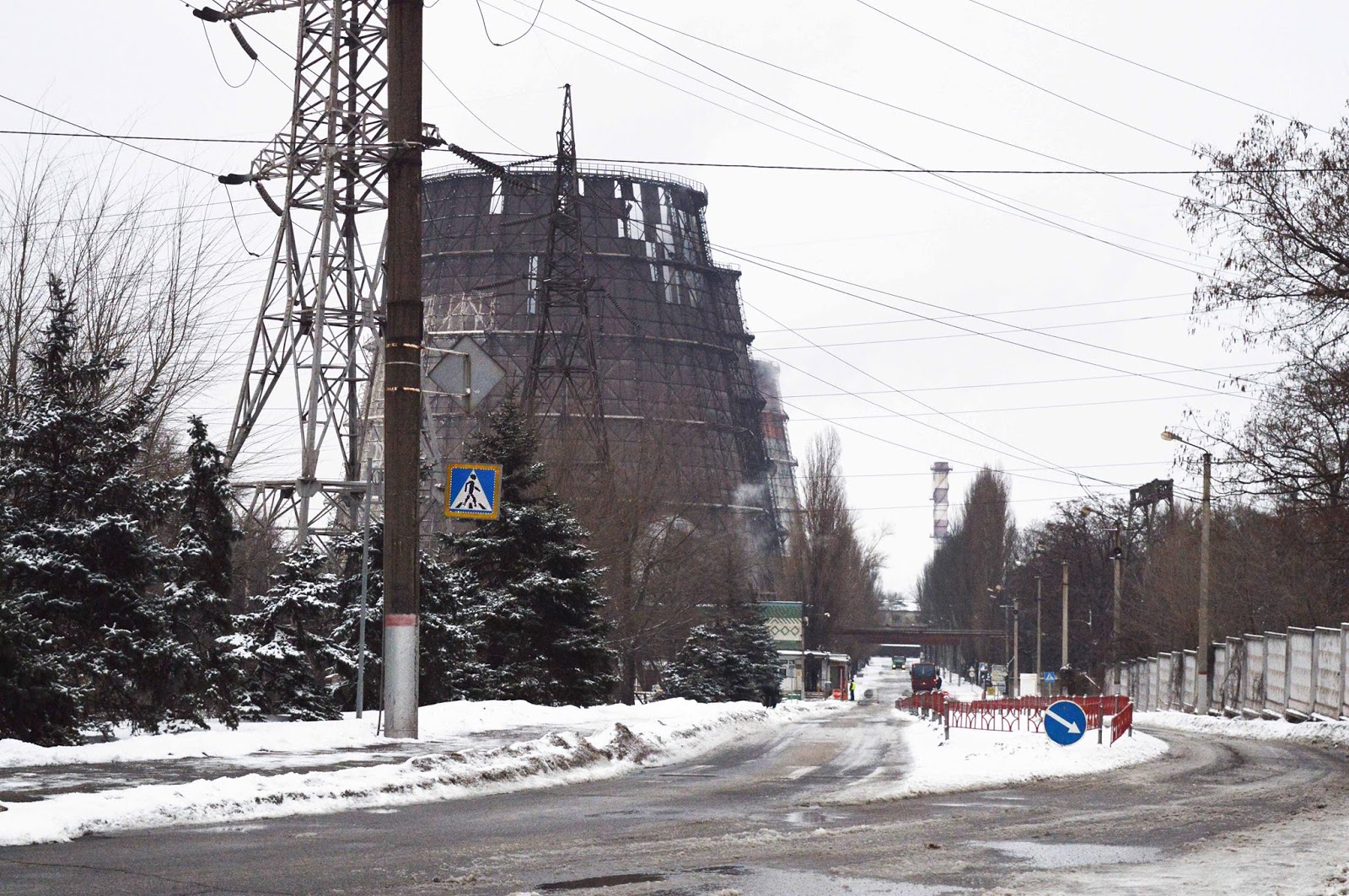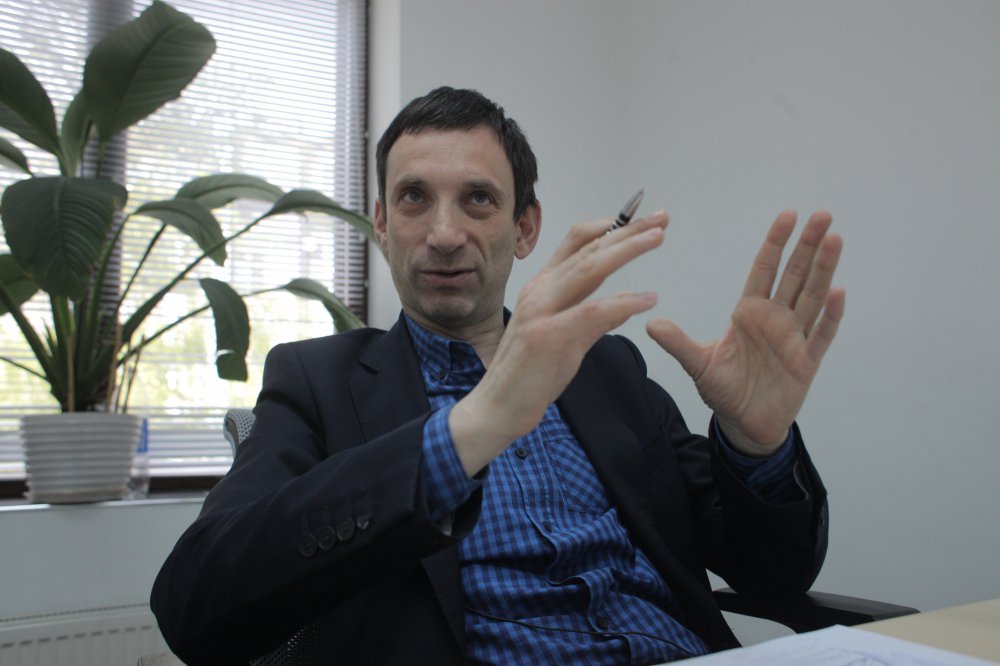Dozens of protesting miners remain underground for more than a month now in an iron ore mine in Kryvyi Rih, Dnipropetrovsk Oblast. The workers are protesting against the poor working conditions in their mines owned by the local Iron Ore Plant, which, in its turn, is controlled by two major Ukrainian oligarchs, Rinat Akhmetov and Ihor Kolomoiskyi. Many miners receive a monthly salary of a mere $195 for hard and dangerous work which provides the second-largest share of Ukraine’s exports.
The strike began on 3 September when 393 miners started their underground protest. Since then, the number of protesters varied between 20 and 300. According to Yuri Samoilov, the leader of a local independent miners’ union, as of 9 October, 21 mine workers with two women among them remained underground in the Zhovtneva Mine in Kryvyi Rih.
The on-the-surface protests also took place in Kryviy Rih, and in the Ukrainian capital, Kyiv. As the local election campaign gains momentum, politicians of various political forces trying to use the miners in their promotion campaigns.
Kryvyi Rih is an industrial city in Dnipropetrovsk oblast which is the birthplace of President Volodymyr Zelenskyy. The city is one of those Ukrainian cities that possess key natural resources and inherited a wide array of industrial infrastructure from the Soviet Union. Now, a large part of this infrastructure is in the hands of oligarchs. The oligarchs continue profiting off of the state without caring much for its development, as they own enterprises, control groups of influence in the Parliament for lobbying the laws they need, have loyal members of the government and media resources.
Kryvyi Rih is a prime example of what happens to a city when it is exploited by oligarchs.
Read also: Why can’t Ukraine just get rid of its oligarchs?
The city’s development stalled in 1980-90s

Metallurgy is second in the structure of Ukraine’s exports, after agriculture and the food industry, accounting for 20.5% of Ukraine’s exports in 2019, according to the data of the Ministry for Development of Economy, Trade, and Agriculture of Ukraine.
The development of mining enterprises boomed in 1950-1960. And in 1963, the Ukrainian Soviet Socialist Republic produced almost 55% of iron ore in the USSR. In the early 1970s, it provided 14% of the world’s production and 43% of the Soviet production of marketable iron ore.
In the 1990s, the production fell significantly, but later, the mining enterprises rebounded.
The largest iron ore basin in Ukraine is located near Kryvyi Rih. The rich ores of the basin are extracted by mining, and the poor ones via the open-pit method.
Despite possessing such great resources, Kryvyi Rih has not changed much since the 1990s and in many aspects is remarkably undeveloped. An example of the dilapidated state of public infrastructure is the sad state of public transportation which stops functioning after 8 p.m., paralyzing life in this city referred to as the longest city in Ukraine. Also, the city didn’t see any new housing construction projects completed in 30 years.
Corrupt local authorities are responsible for the current situation, contributed by the fact that oligarchs have been exploiting local natural resources without putting much effort into the development of the local infrastructure and the city in general.
Natural resources located in the city are a major source of oligarchic enrichment

The Kryvyi Rih Iron Ore Plant is Ukraine’s largest private enterprise for the underground extraction of iron ore. Mines Batkivshchyna, Zhovtneva, Hvardiyska, Ternivska belong to the plant and are the main structural subdivisions of the enterprise.
Until very recently, the group Metinvest owned by oligarch Rinat Akhmetov, and the group Privat by another tycoon, Ihor Kolomoiskyi, were considered as the managing groups that shared the ownership of the enterprise in equal parts.
However, Mykhailo Volynets, an MP from Yuliya Tymoshenko’s Batkivshchyna party and the head of the Confederation of Free Trade Unions has recently informed that Kolomoiskyi formally got rid of his 50% of the shares. The MP alleges that Kolomoiskyi has re-registered his share in a way that it is now split between four other companies. This action, Volynets says, was made to avoid possible sanctions by European countries which are now investigating the transparency of the activities of Kolomoiskyi’s Privat group.

Read also: Ukrainian government sets ambitious goals for privatization of state enterprises
As Business Censor reported, in 2018 the Ukrainian state budget received UAH 39.8 bn (about $1.4 bn) from rental payments for subsoil use across the country. Its largest share (a whopping 92%) came from rent for the extraction of natural gas, oil, and gas condensate. At the same time, the rent payments for iron ore mining in 2018 amounted to only UAH 2.04 bn (about $72 mn), according to the State Fiscal Service data.
The report emphasizes that iron ore is a non-renewable raw material that oligarch companies extract from Ukrainian deposits and export to other countries in the form of ore concentrate, pellets, or metal semi-fabricated products.
More than half of a hundred miners remained underground for more than three weeks

While oligarchs enrich themselves by exploiting subsoil resources, ordinary miners risk their lives and health in poor working conditions. Their work is not paid properly for as well.
The protests at the Kryvyi Rih Iron Ore Plant started on 3 September when 393 miners remained underground. Due to bad health conditions, some had to return to the surface. On 25 September, 111 miners remained underground, Ukrinform reported. And the protests were also ongoing in front of the plant. As of 9 October, 21 miners continued protests.
Miners in front of the Parliament.
Kryvyi Rih miners protesting near the Verkhovna Rada. Kyiv, 15 September 2020.
With demands to improve the working conditions and increase salaries, on 15 September they reached Kyiv and protested in front of the Parliament’s building. The protesters described it as a step to “break the informational blockade,” as central Ukrainian TV channels are oligarch-owned. The miners believed that the information about their strikes was removed from the air.
The main demand of the protesters is “Increasing salaries up to $1000.” Except for the salaries, the miners also complain about the attitudes of the management to them and risks of bonuses being taken away from some categories of workers.
One of the protesters told that, at most, wages of the lower-end workers in the mine are a mere UAH 5,500 (about $195).
They also complained that President Zelenskyy, who is originally from Kryvyi Rih, neither intervened in the situation nor come out to the miners in person.
So far, the negotiations between the miners and the management of the plant had not brought any results.
The enterprise believes that miner strikes are illegal

On 24 September, the board of the enterprise published a press release stating that it was doing its best despite the fact that “the demands of the miners are knowingly impossible” to fulfill. The board considered the strike illegal and called upon law enforcement to forcibly stop “violation of law” blocking the production process and “give a legal assessment” to the protesters, as well as prepared the country for long downtime.
On 23 September, at a session of Kryvyi Rih City Council, its councilors supported for the second time an appeal to the President, the Cabinet of Ministers, the Parliament of Ukraine, and the Ministry of Infrastructure regarding the situation. The State Labor Service of Ukraine found 190 violations at the iron ore plant during a scheduled inspection conducted on the instructions of the Prime Minister of Ukraine, Denis Shmygal.
Politicians attempt to use the miners for self-promotion at local elections
Meanwhile, as the local election campaign kicked off in Kryvyi Rih, local politicians attempted to use the striking miners as a self-promotion tool. The local elections across Ukraine are going to take place on 25 October this year.
For example, the local mayor, 70-year-old Yuriy Vilkul, who has been heading the city since 2010 and is going to again run for mayor, started providing aid to the miners. According to local residents, never before has Vilkul paid attention to the problems of miners in his city.
However, he has always been seen as a crony of oligarch Akhmetov in the region. That’s why Vilkul as a mayor always covered the enterprises of the oligarch.
However, with these local elections, the situation in the city has changed. This time another crony of Akhmetov is going to compete for Kryvyi Rih’s mayor position as a nominee of the Servant of the People party. It’s Dmytro Shevchik, the head of the Central Mining and Processing Plant that is a part of Akhmetov’s Metinvest Group.
The newspaper Novoye Vremya, referring to its insider source in the Servant of the People, says that Akhmetov didn’t expect Vilkul to run for the position again.
Thus, the old mayor started campaigning in a more unfriendly way towards the enterprises owned by the oligarchs to whom he was loyal for all of these years.
So Nataliya Shyshka, Kryvyi Rih City Council MP criticized Vilkul’s alleged attempts to rebuke Akhmetov’s enterprises.
“You worked like clockwork to lobby and implement all the whims of the managing groups, on which you are now writing, especially Metinvest, that its owners [lost touch with reality]. Everything was so good and well between you. You lobbied their interests against the interests of the territorial community and against the same interests of the working collectives of miners,” she said.
Read more:
- Wave of strikes sweeps over occupied Donbas as coal mines are shut down
- Scandalous Ukrainian mayors prepare to win. Again.
- Indispensable oligarchs: Ukraine turns to business leaders to support anti-coronavirus efforts
- Ukraine’s largest steel producer & foreign investor accuses SBU of raid, Zelenskyy – of “eco-populism”
- Activist behind Novorossiya’s defeat in Kryvyi Rih: I am hit with five lawsuits for my civic stance
- The mayoral election in Kryvyi Rih puts the system in agony (2016)
- Thousands protest vote-rigging in Kryvyi Rih, demand to change oligarchic rule (2015)






